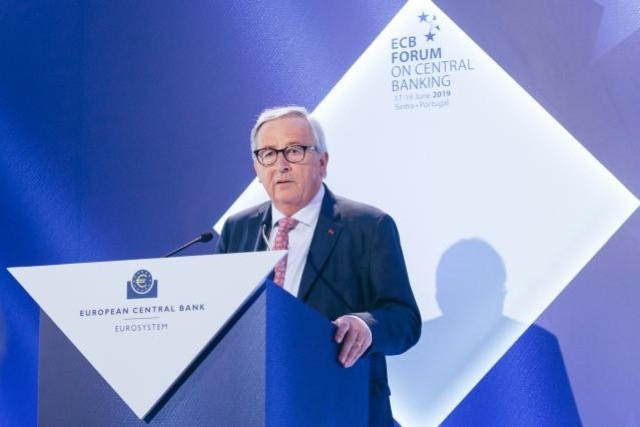Amid the celebrations on 1 January 1999 as the euro was introduced as the currency in Luxembourg and 10 other EU countries, a secret plan was literally being burned in Luxembourg. 50 billion worth of notes of the new Luxembourgish franc, a currency that never saw the light of day, were deliberately destroyed by fire.
The revelation was made by Jean-Claude Juncker during a speech at the European Central Bank Forum on Central Banking in Sintra, Portugal on Wednesday. “I have to make a solemn confession to a room full of central bankers,” he said. “The Luxembourgish government secretly printed 50 billion in a new--and secret--currency: the Luxembourgish franc.”
The idea to print its own currency, to diverge from its monetary union with Belgium if necessary, arose in 1993 after both the Netherlands and Germany indicated they wanted to follow the lead of the UK and leave the European Exchange Rate Mechanism, Juncker explained. “They believed their economic fundamentals were by far much stronger than those of France and of others,” he added, referring to southern EU member states. If the Germans and the Dutch left the ERM, the fear was that other countries could follow.
While EU finance ministers and treasury directors struggled to find a solution, Juncker came up with the idea to create Luxembourg’s own currency. He only ever confided in his then prime minister Jacques Santer and Grand Duke Jean, Juncker told the meeting on Wednesday.
Hedging against all eventualities
Saying that such action would be “irresponsible, reckless” now, Juncker said that the mitigating circumstances of 1993, when Luxembourg relied on the currency of its neighbour and was exposed to the risks of the markets, meant “we had to hedge ourselves against all eventualities,”
To mask their intentions, the government decided to print notes with a portrait of Grand Duchess Charlotte, who had died in 1985 and had abdicated from the throne in favour of her eldest son, Grand Duke Jean, in 1964. “We said to ourselves: nobody will believe, that we are launching a new currency in Europe with the image of the old Grand Duchess,” Juncker explained.
The solution to the Exchange Rate Mechanism crisis, Juncker said, was to widen the intervention bands of the ERM from 2.25% to 15%, “to make the system less vulnerable to speculation.” But when that idea was made public, Juncker recalled, “newspapers and leading academics wrote that it was the end of the single currency, when in reality it was the rescue of the single currency.”
Juncker also spoke fondly of then British chancellor of the exchequer Kenneth Clark, calling him a real statesman. He recalled that even though the UK had left he ERM under pressure from the markets, Clark had told Juncker personally that “I would like my grandchildren to be able to pay in euro one day.”
Of course, no Juncker speech would be worth its salt without some dry humour. He said that the burning of the never-used bank notes on 1 January 1999 “was a major performance by the Luxembourgish army. For once, they had a job to do.”
